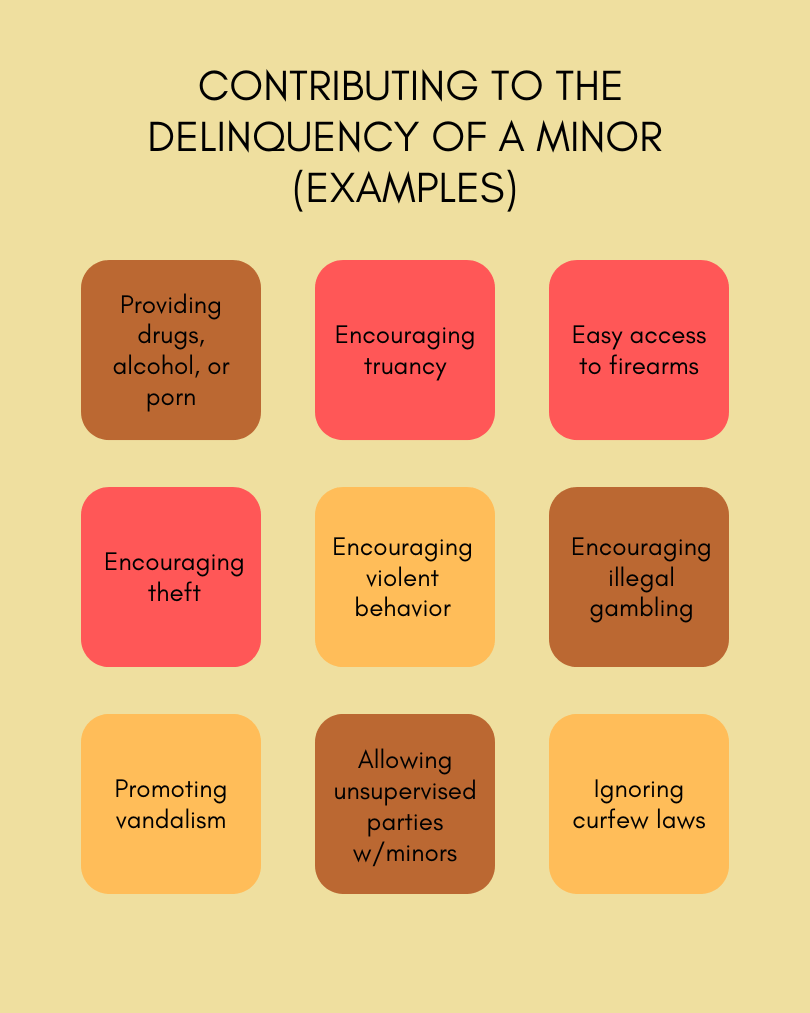
Understanding the legal implications of our actions is crucial, especially when it comes to our interactions with minors. In this post, we will explore the concept of “contributing to the delinquency of a minor,” a legal term that carries significant consequences. We’ll delve into what it means, provide examples, and discuss the potential legal repercussions.
Definition of Delinquency
Delinquency, in a legal context, refers to a variety of behaviors that are illegal or considered inappropriate for minors. These behaviors can range from truancy (skipping school without a valid reason) to more serious offenses like theft or assault. When an adult encourages or aids a minor in committing such behaviors, they may be charged with contributing to the delinquency of a minor. This is a serious offense that can have lasting impacts on both the adult and the minor involved.
It’s important to note that the laws and definitions surrounding delinquency can vary from state to state. For example, in Colorado, the legal system uses a different approach to property division during a divorce, which can indirectly impact cases related to delinquency. You can read more about this in our post on whether Colorado is a community property state.
Understanding “Contributing”
Contributing to the delinquency of a minor involves an adult knowingly aiding, encouraging, or causing a minor to become delinquent. This can take many forms, from providing a minor with alcohol or illegal substances to encouraging them to commit a crime. It’s a broad term that encompasses any action by an adult that can lead a minor down a path of delinquency.
It’s also worth noting that the adult’s actions don’t necessarily have to result in the minor’s delinquency for charges to be brought. The mere act of encouraging or facilitating delinquent behavior can be enough for a charge of contributing to the delinquency of a minor.
Examples of Contributing to the Delinquency of a Minor
There are numerous ways an adult can contribute to the delinquency of a minor. Here are a few examples:
- Providing Alcohol or Drugs: If an adult provides a minor with alcohol or illegal drugs, they can be charged with contributing to the delinquency of a minor. This is one of the most common examples of this offense.
- Encouraging Illegal Behavior: An adult who encourages a minor to engage in illegal activities, such as shoplifting or vandalism, can be charged with this offense. This can also include encouraging a minor to skip school (truancy).
- Failure to Exercise Proper Control or Supervision: If an adult is responsible for a minor and fails to adequately supervise them, leading to the minor’s delinquent behavior, they can be charged with contributing to the delinquency of a minor. This could include situations where a minor has parties with alcohol at their home while their parents are away, and the parents were aware of the party and did nothing to prevent it.

Legal Consequences
The legal consequences for contributing to the delinquency of a minor can vary widely depending on the jurisdiction and the specifics of the case. However, it’s important to understand that this is a serious offense that can result in significant penalties.
Generally, contributing to the delinquency of a minor is considered a misdemeanor offense, but it can be elevated to a felony charge in certain circumstances, such as if the adult’s actions resulted in significant harm to the minor. Penalties can include fines, probation, community service, and in some cases, imprisonment.
It’s also important to note that these are just the direct legal consequences. Being charged with this offense can also have significant indirect consequences, such as damage to one’s reputation and potential difficulties in finding employment.
Case Studies
Consider this real case in Colorado:
- Gorman v. People – The Colorado Supreme Court ruled that the culpable mental state of “knowingly” does not apply to the age element of the statute on contributing to the delinquency of a minor. This decision means that an adult can be convicted for contributing to the delinquency of a minor even if they were unaware of the minor’s age, as long as they knowingly induced, aided, or encouraged the minor to engage in illegal behavior. The ruling emphasizes the law’s focus on protecting minors by holding adults accountable for their influence, regardless of their knowledge of the minor’s exact age.
Let’s consider a hypothetical situation to illustrate the concept of contributing to the delinquency of a minor:
Imagine a woman named Sarah who has a 15-year-old neighbor, Jake. Jake’s parents are often away for work, and he spends a lot of time alone. One day, Jake asks Sarah to buy him some beer for a party he’s planning to throw at his house while his parents are away. Sarah agrees, thinking little of any potential consequences.
However, the party gets out of control, the police are called, and they discover that Sarah provided the alcohol. In this situation, Sarah could be charged with contributing to the delinquency of a minor, as her actions led to a minor engaging in illegal behavior.
This situation could have been avoided if Sarah had understood the importance of promoting positive behaviors, as well as the laws related to providing alcohol to minors. Instead of agreeing to buy the alcohol, she could have talked to Jake about the potential consequences of his actions and suggested alternative ways to have fun with his friends.

Preventive Measures
While understanding the legal consequences of contributing to the delinquency of a minor is important, it’s even more crucial to understand how to prevent such situations from occurring in the first place. Here are a few preventive measures adults can take:
- Understand the Laws: Familiarize yourself with the laws related to minors in your state. This includes laws about providing alcohol or drugs to minors, curfew laws, and laws about leaving minors unsupervised.
- Exercise Proper Supervision: If you are responsible for a minor, ensure that you are providing adequate supervision. This doesn’t mean you need to watch their every move, but you should be aware of their activities and who they are with.
- Promote Positive Behaviors: Encourage minors to engage in positive behaviors and activities, such as sports, clubs, or volunteer work. Providing a positive influence can help steer them away from delinquent behaviors.
Remember, the best way to avoid legal issues is to stay informed and act responsibly.
Legal Advice and Conclusion
It goes without saying that this post represents a general overview of the concept of contributing to the delinquency of a minor, it’s important to remember that laws can vary significantly from state to state. If you or someone you know is facing charges related to this offense, it’s crucial to seek legal advice. A knowledgeable attorney can provide guidance tailored to your specific situation and jurisdiction.
For more information on related legal topics, feel free to explore our other blog posts, or reach out to us at 720-613-8268.





